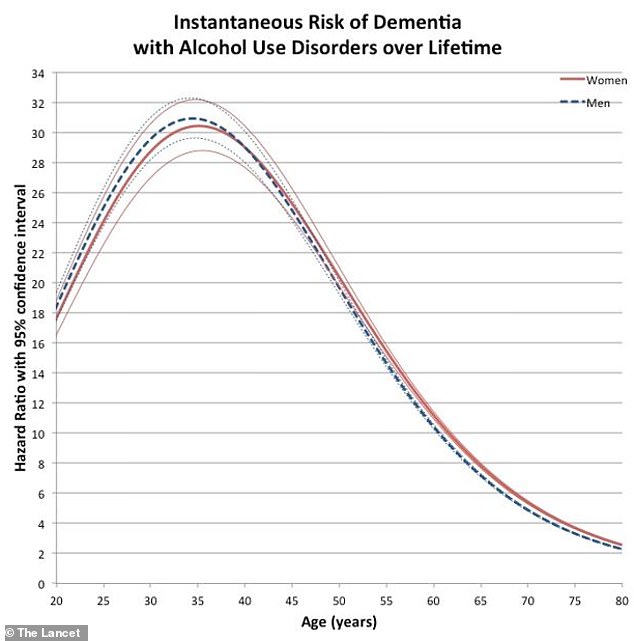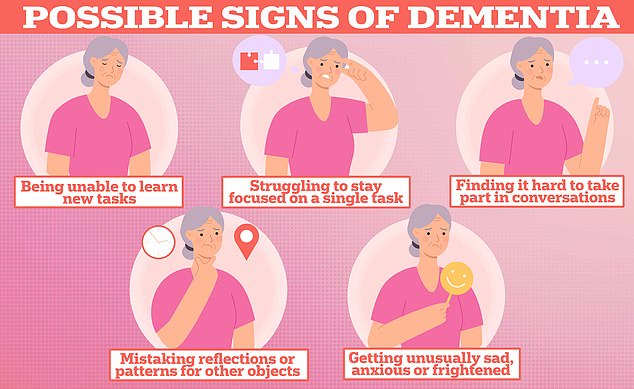Research shows that lifestyle changes such as eating less, staying active and quitting alcohol and cigarettes can halve the risk of dementia.
A study published this week finds that half of dementia cases could be prevented if people adopted healthier, more environmentally friendly lifestyles.
A groundbreaking paper published Wednesday shows that it is easier for people to protect themselves from disease than many think.
The Lancet Commission on Dementia will list 14 lifestyle and environmental factors that can be modified to reduce the risk of dementia.
It is expected that almost half of dementia cases are due to these factors.
By eating less, staying active, quitting alcohol and cigarettes, and training the brain, people can take control of their destiny, even if they have a high genetic risk.
Half of dementia cases could be prevented if people adopted healthier, more environmentally friendly lifestyles (stock image)

One lifestyle change that may reduce the risk of dementia is quitting alcohol and cigarettes (stock image)
A separate study presented yesterday at the same conference found that a new blood test can predict Alzheimer’s with 90 percent accuracy, more accurate than current methods.
This breakthrough could lead to better diagnoses, giving more patients access to new drugs that are more effective when taken early in the disease.
Hilary Evans-Newton, director of Alzheimer’s Research UK, said: ‘People still think dementia is inevitable. You either get it or you don’t, and there’s nothing you can do about it.
“But there are things you can do throughout your life to reduce your risk of dementia and live longer, healthier lives.”
The latest update will be presented at the Alzheimer’s Association International Conference in Philadelphia.

Eating less and staying active is another lifestyle change that can help people avoid dementia (stock image)

It is possible for people to take control of their own destiny even if they are at high genetic risk (stock image)

Previous research published in The Lancet found that 50 percent of French adults with young-onset dementia also have a history of alcohol abuse.
The previous edition of the Lancet Commission, published in 2020, listed 12 modifiable risk factors: blood pressure, obesity, alcohol consumption, smoking, lack of exercise, diabetes, brain injury, social isolation, hearing loss, depression, keeping the brain active and air pollution.
The weight of scientific evidence in this area has grown in recent years and the new report is expected to go further, the Sunday Times reported. It will add two new lifestyle and health risk factors and call on governments to intervene earlier to help people reduce their risk.
Neuroscientists have discovered that using the brain for abstract, high-level thinking throughout life protects against certain aspects of dementia.
The theory that this “cognitive reserve” can help people stave off dementia, especially in the early stages, has led to a wave of “brain training” apps and programs.
Nearly one million people in the UK are estimated to have dementia, according to data published last week, marking an unprecedented high in the number of diagnoses.

The study found that in at least 40 percent of cases, the onset of dementia could be delayed or even prevented altogether by lifestyle changes.
This week’s report is expected to show that in at least 40 percent of cases, dementia can be delayed or even prevented altogether through lifestyle and environmental changes.
Sarah Kennedy, 54, from Orkney, gave up her job as a residential support worker to support her two parents with dementia.
She said, “I don’t want my children to go through what I went through with my own parents.
‘They’ve been married for almost 60 years. It’s been a very strong, loving marriage – but now they don’t really know each other anymore.’ Her genetic inheritance means she is at increased risk of developing the disease, but she is determined to do what she can to reduce her risk.
She added: ‘There’s a huge opportunity here because the world has changed in the last decade in terms of dementia science, but I don’t think our healthcare system has kept up.
‘Right now we’re trying to treat and support people who are in the very end stages of this condition, often when they’re in crisis.
‘We need to rethink this, and I think prevention is key to that.’ She called on the NHS to do much more to educate patients about the links between dementia and wider health factors.
“We need to change the way we do that a little bit,” she said.
“People think it’s fate, but actually there are things you can do. Looking ahead, it’s about what I can do for myself and what I can do for my children.”

